The Ultimate 2020 Libertarian Gift Guide
Reason's writers and editors share their suggestions for what you should be buying your friends and family this year.
"It's that time of year again" doesn't land quite right this year. It is, in fact, that time of year again—the time for religious festivals and giving thanks, for peppermint candy and evergreen needles, for wassailing and hall-decking, and for the sounds of Mariah Carey's Christmas renditions playing on repeat. (In the spirit of honesty, I admit I am known to play a certain Carey holiday classic on loop in the Reason offices no matter the time of year, but I digress.)
It's also the time for gift-giving!
But this year, is, uh, a bit different. The COVID-19 pandemic has wreaked havoc on 2020, and I'm sure I'm not the only one who hopes we never again have a time of year like this one. This is my grown-up Christmas list.
Yet the world keeps on turning in these unorthodox times, and you still have to find a way to get that shopping done—even if you're in, say, California, as I am, where stay-at-home restrictions have made patronizing your favorite businesses a bit difficult. Take heart! The Reason team has you covered with a slew of creative and personality-driven suggestions to make your present-hunting a bit easier in these trying times.
I would be remiss if I didn't recommend A Glorious Liberty: Frederick Douglass and the Fight for an Antislavery Constitution, a new book by Reason's own Damon Root about the man who, perhaps more than anyone, insisted that the U.S. live up to its founding principles. "Root and Douglass, like root beer and ice cream, are an irresistible American combination," writes The Washington Post's George Will in a review. Yum.

Also at the very top of everyone's lists should be Ten Global Trends Every Smart Person Should Know: And Many Others You Will Find Interesting by Reason's Ron Bailey and the Cato Institute's Marian Tupy. It makes a highly compelling case that the world is, in fact, getting better, which, according to the data, will surprise the vast majority of America. (Shocking!) Don't just take their word for it, though—they've brought the receipts. The poverty rate? It's plummeted. Life expectancy? It's more than doubled over the last century. Natural resources? There's more of them, and they cost less. After the year we've all had, we could use some good news. This book is good news.
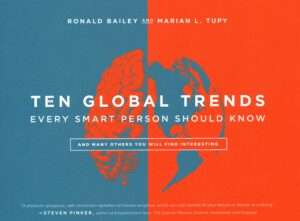
And for any number of miscellaneous ideas, check out the weekly recommendations from The Reason Roundtable, our flagship podcast where editors sign off with their favorite cultural items of the moment, whether it be a novel, a video game, a cocktail-infused newsletter, or, in last week's case, Reason magazine itself. (We sell yearly gift subscriptions for less than $20, which is well worth the cost of converting a friend!)
As for a personal recommendation, I love to give experiences—Celine Dion tickets, a trip to the ballet, a bird-watching cruise, oh my!—but those are likely moot for the next several months. The birds will have to wait. So might I suggest you do one better and donate an experience in the name of that friend or family member who has a soft spot for criminal justice reform? There's the Pawsitive Change Prison Program courtesy of Marley's Mutts Dog Rescue, a group that hopes to reduce recidivism by teaching inmates how to train at-risk shelter pups over a rigorous 14-week curriculum. For the more religious giftee, you can send your dollars to a number of initiatives at Prison Fellowship; my favorite is the Prison Fellowship Academy, which employs a personalized approach to tackling the root cause of an inmate's criminal past so that they'll avoid a criminal future. And if you're looking for a family bonding activity, pick out some prison pen pals and send some holiday cheer via snail mail.

Now, without further ado, here are your Reason writers' and editors' carefully honed and versatile picks for spreading some holiday cheer. Glad tidings! —Billy Binion, Assistant Editor
For the budding scientist (or the hardheaded science denier):
What is science? A serviceable definition can be summed up as follows: It is the pursuit of knowledge and understanding of the natural and social world using a systematic, evidence-based methodology.
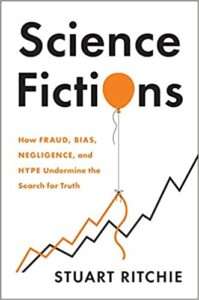
Scottish psychologist Stuart Ritchie persuasively and urgently makes that case in Science Fictions: How Fraud, Bias, Negligence, and Hype Undermine the Search for Truth: "Science, the discipline in which we should find the harshest skepticism, the most pin-point rationality, and the hardest-headed empiricism," he writes, "has become home to a dizzying array of incompetence, delusion, lies, and self-deception. In the process, the central purpose of science—to find our way ever closer to truth—is being undermined."
That might sound familiar right about now as we navigate a pandemic where swaths of people disagree on the facts. Fortunately, Ritchie outlines the necessary steps to take in order to restore trust in science by, among other things, encouraging replication, applying anti-plagiarism algorithms, requiring open access to all data, and reducing the incentives to overhype findings. —Ron Bailey, Science Correspondent
For the picky (yet practical!) coffee snob:
Getting through 2020 has required a lot of caffeine, but it's also changed how I've prioritized the coffee-making experience. Side trips to the office coffeemaker or the café down the block have been limited. Using a pour-over kit or French press might be nice for that first cup, but there's no way I'm going through that whole process five or six times before 3 p.m.

And yet efficiently making a large enough volume of coffee to last all day presents other problems. How do you keep it warm without being left with burnt dregs, the unavoidable result of a glass carafe sitting on a warming plate for hours?
The Hamilton Beach BrewStation has been the answer for me. It makes 12 cups at a time—enough to keep even the most hardened addict set for a few hours—and has an internal reservoir with a built-in heating element to limit burning. The last cup won't taste exactly like the first sip, but then again, nothing ever does.
And it costs less than what you used to spend on Starbucks in a couple of weeks. Once the BrewStation pays for itself, use the savings to order up some bags of fresh beans from a local coffee shop (or someplace halfway across the country), get out your Reason mug, and offer cheers to the globe-spanning supply chains that make it all possible. —Eric Boehm, Reporter
For the seasoned gamer:
Euphoria is just one emotion you'll feel when playing this ultra-complex, post-apocalyptic-themed, worker-placement board game from Stonemaier Games.
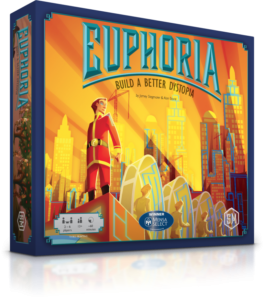
Between two to six players compete to "build a better dystopia" by collecting resources and artifacts in a Brave New World-like landscape, all while trying to keep their workers' morale high and their intelligence low (lest they get dissatisfied with their station in this totalitarian future).
The gameplay itself resembles other worker-placement games like Settlers of Catan, though it comes with a lot more rules, pieces, and ways to win. That occasionally frustrating level of detail creates a steep learning curve for beginners, but also a tremendous amount of replay value for veteran players trying to find the optimal path to victory.
Euphoria's strategic depth and bizarre—yet charming!—artwork help justify the higher-than-average list price, making it the perfect gift for that special board game nerd in your life. —Christian Britschgi, Associate Editor
For the fashionable libertarian:
I bought one of these scarves at the Free State Project's Liberty Forum last February and have had so many people ask where I got it. It's a really nice weight and texture and has held up well with washing. Plus, it can double as a face covering, with some libertarian flair, in a pinch!

"No one will step on THIS snake while you wear it," reads the product description. Can confirm. —Elizabeth Nolan Brown, Senior Editor
For the self-care queen (or king):
Libertarians, it's time to take a break. It's been a hard year for everyone and it looks like the discourse will only get worse. So after reading some Reason stories for the day, treat yourself or someone you love to the gift of self-care.
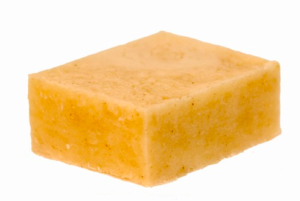
Start with a blessed bar of soap from Monastery Creations. This ain't your momma's bar of soap! It's actually your sister's. Well, a Catholic sister's, created entirely by the Benedictine Sisters of Perpetual Adoration. I personally recommend the sage meadow bar, which has worked wonders for my face. Each batch is made with a few drops of holy water and a prayer—something we all could use a little of after this unsettling year.
Pair with this ginger/orange/eucalyptus candle from Reason icon Lauren Krisai, who's been an important criminal justice reform advocate over the years.
And lastly, listen to queen Blue Ivy Carter narrate Matthew Cherry's "Hair Love" in the background, a book which I may or may not be recommending because the main character shares a name with another Reason writer who also cares a lot about criminal justice reform. (That would be me.) —Zuri Davis, Assistant Editor
For the baby crypto bro:
"How do I invest in bitcoin?"

That's a question that more people than ever will be asking the libertarians in their lives this holiday season, thanks to the recent stunning price surge and bullish chatter on CNBC and elsewhere. The simple answer: Open an account on Coinbase or the Cash App, or buy some on PayPal, which recently started allowing U.S. customers to purchase cryptocurrencies inside their accounts. These platforms are like any other exchange or financial account: Send them money, and they'll purchase and take care of your bitcoins for you.
That's the easy way to do it, but it doesn't take advantage of one of bitcoin's game-changing attributes. Satoshi Nakamoto created the first digital asset without third-party intermediaries. That means you can physically hold possession of your own bitcoins, so governments will have a harder time confiscating them. If you think that's wildly implausible, remember that in 1933 President Franklin D. Roosevelt signed an executive order making it illegal for Americans to own gold. It wasn't repealed until 1974. So this holiday season, encourage the budding bitcoin enthusiasts in your life to use Nakamoto's invention the way it was intended. Gift them "hardware wallets," which are basically flash drives with all sorts of advanced security features built in to keep cryptocurrency from being lost or stolen.
How will they get bitcoins onto the device? They'll be able to connect their hardware wallets to a computer to transact with other users or cryptocurrency exchanges. It's like having your own digital gold vault doubling as a full-service bank that conveniently slips into a pocket or a desk drawer.
There are a handful of reputable brands, including Trezor, which sells the entry-level "model one" for $55. Many people also swear by the elegant Ledger Nano S, which retails for $59. Buy only direct from the companies to make it less likely that the built-in software has been tampered with by hackers. Being your own bank is terrifying and exhilarating. Help your friends and family join the monetary revolution! —Jim Epstein, Executive Editor of Reason TV
For the boomer who still enjoys a little Reefer Madness:
This year, why not give the gift of a safe, increasingly legal way to get a little distance from reality? Thanks to at least some form of legalization or decriminalization in every state, there has never been a better time to make and share edibles with your loved ones.

I particularly recommend pot brownies for your boomer friends and relatives, who likely have residual nostalgia for THC in baked-goods form, but may not have the wherewithal to acquire their own supply in the current grey market. Remember that while many states have legalized it, cannabis has yet to be legalized at the federal level, so be cautious about interstate shipping. If you're looking to buy close to your recipient, try Where's Weed. But everyone loves a homemade gift, so consider making your own according to my well-tested official Reason recipe. Feel free to hit me up on Twitter if you have questions or just need help with the math. —Katherine Mangu-Ward, Editor in Chief
For the self-reliant problem-solver (with a resilient stomach):
For many years, I relied on chemical clog-busting gels to fix a slow bathtub drain, knowing full well that such products are bad for the environment and corrosive on pipes. But when Drano failed me earlier this year, I took some inspiration from desert DIYer and Reason Contributing Editor J.D. Tuccille, and I set about finding a more sustainable and hands-on approach.
My local hardware store sold me a short metal snake that had a claw on the end and a spring-loaded trigger on the other. This device is very cool, but proved impossible to get through the cross grate caulked into the floor of my bathtub. As a renter, I didn't feel comfortable disassembling anything I couldn't put back together with a screwdriver. I also didn't like the idea of asking my landlords to pay a plumber for a hairball problem.
So I asked myself: What would J.D. do?
I went back to researching, and that's when I discovered the Annie Sullivan of plumbing products: a flexible plastic strand with teeth and a pull tab. No matter how small your tub drain, this plastic thing can get through it. No matter how thick the hairball lurking in your pipes, this plastic thing will grab it and pull it out. A pack of them on Amazon costs less than $10, and each one can be used several times apiece.
My advice? Snake the drain after a shower. The hairball will be wet and slimy and easier to pull out in one giant, satisfying mass. —Mike Riggs, Deputy Managing Editor
For the friend who still uses a filing cabinet (and who really should stop doing that):
The reMarkable 2 is part of that class of luxury object that does very little—but does it very well. It's a black and white tablet that can't play music and won't let you surf the internet. Instead, it offers a digital replacement for paper that looks and feels almost like the real thing. Take notes by hand and the software will convert your words to text and email them to the destination of your choice. Sketch out ideas during a brainstorming session and then use the reMarkable desktop app to refer back to the results. Read and mark up (grayscale) documents and save them in the cloud, freeing up coveted office storage space that might otherwise be filled by notebooks and three-ring binders. A Chrome browser extension even lets you convert web articles to PDF and transfer them to your device for offline consumption.

Billed as the thinnest tablet on the market, the reMarkable 2 features an eye-friendly (and energy-efficient) E Ink display—the kind made famous by old-school Kindles. Its user interface is simple and relatively intuitive. And its pressure sensitivity allows the stylus to impressively mimic the experience of writing or drawing with a real pen or marker. There's no question that $399 feels steep for a device that won't even let you check Facebook. But the lack of distractions is part of the selling proposition: By cutting out everything that's not essential, the reMarkable suggests, it can bring focus and pleasure back to the tasks of reading, writing, and thinking. —Stephanie Slade, Managing Editor
For the bar-hopper who can no longer hop to bars:
Bitters are an essential part of many classic cocktails, including the Old Fashioned, the first cocktail in the American tradition. A boozy infusion of herbs, roots, and spices, bitters are generally used in tiny drops, as a kind of cocktail flavoring. They're the bartender's spice rack.
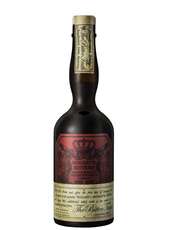
Sadly, the cocktail bitters that were used in early drinks were lost by Prohibition. Today they exist only as replicas, like The Bitter Truth's Bogart's Bitters, a historical recreation of the brand first mentioned in Jerry Thomas's seminal 1862 cocktail book, extra booze you've been buying in 2020. —Peter Suderman, Features Editor
For the modern John Wayne:
Who doesn't like a .22 caliber gun? They're handy plinkers, capable of clearing varmints out of the garden, and of putting small game in the pot. They don't cost a lot to feed and can be handled by pretty much anybody who cares to develop shooting and survival skills. And the caliber is available in everything from classic revolvers, to single-shot youth rifles, to semiautomatics that can be tricked out in ways that make coastal politicians suffer heart palpitations.

But sometimes you want to blast bunnies in the backyard without getting the neighbors all hot and bothered. That's where the .22 air rifle comes in—a punchier bigger brother to the classic .177 caliber. After years of pumping an ancient Benjamin air pistol to knock down rabbits—which conveniently rely on "make more rabbits" as their survival strategy—I recently purchased a break-action air rifle.
My choice was the Stoeger S4000-E, a single-shot weapon powered by a gas piston that compresses when you open the action (with a fair exertion of strength) to insert the pellet. Unlike firearms, pneumatics can be fitted with sound suppressors without regulatory muss and fuss, and this Stoeger has one integrated. The result is a remarkably quiet shooter that can knock down pests and small game without raising eyebrows.
Like many air guns, the Stoeger is finicky about pellets. But at a time when even .22 long rifle ammo can be pricey and difficult to find, pellets remain abundant and inexpensive for even the better brands. The trigger is a bit mushy no matter how you adjust it, so feel free to go up-market if your budget allows (the Diana 34 is well-regarded). But for me the price vs. quality point is right and I have no complaints so far. In most jurisdictions, pneumatic weapons are unregulated or subject to light regulation relative to firearms, so chances are you'll be able to ship this directly to the recipient with little or no hassle. —J.D. Tuccille, Contributing Editor
For the nostalgic Middle-earth vagabond:
There is a persuasive argument to be made that, like the Beatles catalog, there really are no nourishing crumbs left from the never-ending lembas cake that is J.R.R. Tolkien and his signature Hobbit/Lord of the Rings stories.
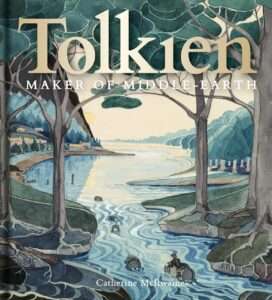
Besides the books themselves, plus the lovingly realized and controversially expanded Peter Jackson film adaptations, and even the wince-inducing Led Zeppelin lyrics, there's plenty more for completists to scratch their itches with—the lousy 1978 animated movie, the probably-shoulda-stayed-unpublished Silmarillion, the mercifully shorter Leonard Nimoy song. There was a young-J.R.R.-in-love biopic as recently as last year, as many video games as Gandalf has nicknames, and, oh yeah, the sprawling Amazon TV series is back in production this month.
Yet in this age of ephemeral, cloud-based media-on-demand, there's a hole near the center of the Middle-earth content mill that can be filled only with a fairly significant chunk of change…and shelf space. It's well-known that Tolkien was a top linguist and unbeatable world-maker—writing book-length backstories, inventing whole languages, and drawing and redrawing meticulous maps. But the diminutive writer was also one hell of a visual artist, painting and sketching often in vivid purples and pinks the Lonely Mountain, the mines of Moria, the bucolic valley of Rivendell.
Most of Tolkien's submitted artworks, alas, were rejected by his publishers for reasons of cost, and so tens of millions of us first and most lastingly encountered his startlingly thorough vision through dog-eared paperbacks with smashed-up words and the odd hand-drawn map of Mirkwood. An immersive literary experience, to be sure, but less than what could have been.
Two special editions of the source material started the process of redressing that oversight. The 50th anniversary hardcover edition of The Hobbit from 1987, currently retailing at $125, has a handsome gold cover with some authorial rune work, plus some fine black-and-white drawings, more maps, and rich color renderings of Hobbiton and the dragon Smaug. The 50th anniversary hardcover of The Lord of the Rings from 2004 (just $70.49!) similarly includes some fold-out maps, color paintings, and gilded packaging.
More recently, and more competitively priced, is the 2015 collection The Art of the Lord of the Rings, which showcases most of Tolkien's visual output in one volume. But my main recommendation is tied to the 2019 Morgan Library & Museum exhibition that first opened my eyes to the philologist's surprisingly good paintings. Tolkien: Maker of Middle-earth, by Catherine McIlwaine, is only $57.27, the largest repository of Tolkienia ever assembled, and—I can testify!—a crowd-pleaser for the LoTR fanatic in your household. —Matt Welch, Editor at Large
For the wanderlust-ridden globetrotter catching the first flight post-pandemic:
I am a glutton for coffee-table books, with their glossy pages and their strange specificity—long-haired surf stars of the early aughts?
If you've never been to one of Xi'an Famous Foods' dozen or so locations in New York City, make haste and remedy that. But since the pandemic has rendered travel much more difficult, you can also live vicariously through this book, and even take a stab at some of their recipes and techniques from the privacy of your own kitchen.
If you're an eating enthusiast, but not much of a cook yourself, you'll benefit from the guide to NYC's various Chinatowns (Flushing in Queens, Sunset Park in Brooklyn, and the classic one in Manhattan). If you're a drinker, you'll appreciate the green tea/Hennessy cocktail recipe that purports to help you "lose your karaoke stage fright" in a hurry—something we might all need help with after a year of being boring shut-ins. And if you're just, well, a libertarian, you'll appreciate Jason Wang's family's immigration story from Xi'an—a "dry, dusty city in northwestern China," heavily influenced by the flavors of the Middle East, full of charcoal smoke and "rough, ragged street noodles swimming in bright red chili"—to Michigan, then Connecticut, then finally Queens.
Wang tells the story of his dad, David Shi, laboring for years, working in restaurants all over the Eastern Seaboard before finally opening up the first Xi'an location in a 200-square-foot basement stall in a shopping mall in Flushing. Shi logged 20-hour days, the simple street fare gained a massive following, and eventually the food-world documentarian Anthony Bourdain came in with a film crew, helping to propel the restaurant to a place of well-deserved prominence.
The operation has expanded in the years since, and has even put out meal kits so customers can try their hand at reproducing Xi'an's famous hand-ripped noodles and spicy cumin lamb at home. In a world that's looked especially bleak for restaurateurs over the last year, put your dollars toward helping some really great labors of love survive, and subtly make the case to skeptics on your gift list that immigration makes America tastier and more entrepreneurial (among other perks) while you're at it. —Liz Wolfe, Staff Editor




Show Comments (47)